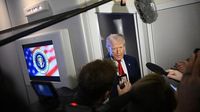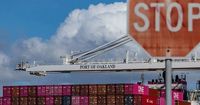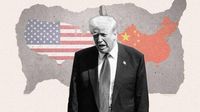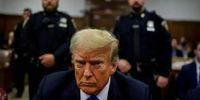A coalition of businesses and conservative lawyers is gearing up to challenge President Donald Trump's recent tariffs, arguing that he lacks the constitutional authority to impose them. This legal battle, anticipated to unfold in the coming days, could see a lawsuit filed as soon as Friday, April 11, 2025, aimed at declaring the tariffs unconstitutional.
Sources close to the situation have indicated that the legal framework for the challenge hinges on the interpretation of the International Emergency Economic Powers Act (IEEPA) of 1977, which Trump has cited as the basis for imposing these tariffs. However, critics argue that the act does not explicitly grant the president the power to levy tariffs, a responsibility that the Constitution assigns to Congress.
According to a prominent conservative lawyer familiar with the situation, there is a "very good chance" that the U.S. Supreme Court would rule against the administration if the case reaches the high court. This sentiment underscores the gravity of the legal arguments against the tariffs, which have already sparked controversy.
The legal challenge is not isolated; it follows a lawsuit filed by The New Civil Liberties Alliance (NCLA) on behalf of Simplified, a Florida-based paper company that alleges it has been harmed by the tariffs. The NCLA contends that Trump's executive orders raising tariffs on Chinese imports exceed the authority granted under the IEEPA. They argue that the act only allows for asset freezes, trade embargoes, and sanctions in response to international emergencies, not the imposition of tariffs.
John Vecchione, senior litigation counsel for the NCLA, stated, "The IEEPA says that sanctions can be invoked for the emergency and for no other reason." This legal perspective raises questions about the justification for the tariffs, particularly as Trump has claimed they are a response to the opioid crisis and China's failure to curb the flow of fentanyl into the United States.
Despite the administration's stance, the NCLA's lawsuit emphasizes that there is no direct connection between the opioid epidemic and the tariffs imposed on Chinese imports. The complaint argues that the IEEPA does not contain provisions for tariffs and that Congress alone has the constitutional authority to regulate commerce with foreign nations.
The complexity of the situation is compounded by the historical context of how presidential powers have evolved regarding trade. For decades, Congress has delegated significant authority to the executive branch, allowing presidents to negotiate trade agreements and adjust tariffs without congressional approval. This trend began with the Reciprocal Trade Agreements Act of 1934, which first granted such powers to President Franklin D. Roosevelt.
In the years that followed, additional laws, such as the Trade Expansion Act of 1962 and Section 301 of the Trade Act of 1974, further expanded presidential powers in trade matters. These legislative actions have led to an ongoing debate about the balance of power between Congress and the presidency, particularly in light of Trump's recent tariff actions.
Emily Ley Paper, the Florida company that filed the lawsuit, argues that the government is attempting to bypass established trade statutes by invoking the IEEPA. The suit highlights that no president has previously used the IEEPA to impose tariffs and questions whether Trump's actions are legally sound.
The NCLA's legal challenge is particularly significant as it represents a broader concern regarding executive overreach. The suit invokes the nondelegation doctrine, which states that Congress cannot simply relinquish its constitutionally mandated duties to the executive branch. This principle raises essential questions about the limits of presidential authority and the need for congressional oversight in matters of substantial economic and political significance.
As the legal proceedings unfold, the implications of the tariffs extend beyond the courtroom. The tariffs have already impacted the stock market, with many Americans expressing concern over their investments and retirement accounts. The potential for a Supreme Court ruling against the administration could reshape the landscape of presidential power in trade.
While some legal experts predict that the conservative majority on the Supreme Court might favor the administration's stance, the NCLA's arguments could resonate given the court's recent decisions emphasizing the need for clear congressional authorization in significant matters.
The upcoming days could prove pivotal as the legal challenge to Trump's tariffs gains momentum. With the stakes high for both businesses and the broader economy, the outcome of this legal battle may set a precedent for how future administrations navigate the complex intersection of trade and executive authority.
As the debate continues, many are left wondering: will Congress reclaim its constitutional power to regulate tariffs, or will the executive branch further consolidate its authority in matters of trade? The answer may lie in the hands of the judiciary, as it grapples with the foundational principles of American governance.







